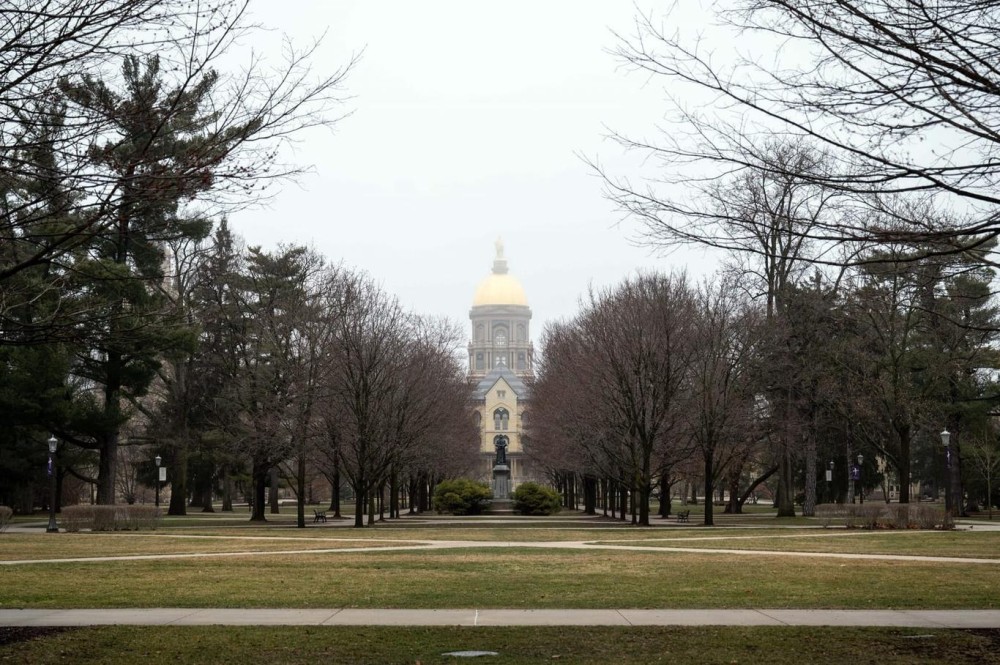
PROSPECT HEIGHTS — Following a historic season, the University of Notre Dame has announced its men’s swimming program has been suspended for at least one academic year after an external review revealed numerous gambling violations.
University of Notre Dame vice president and athletic director Pete Bevacqua announced on Aug. 15 that the decision follows an external review that was conducted after the university received reports of possible misconduct on the men’s swimming team.
Bevacqua said in a statement that the external review confirmed the university’s “initial concerns about a deeply embedded team culture dismissive of Notre Dame’s standards for student-athletes, including our expectation that they treat one another with dignity and respect.” The review also found, according to Bevacqua, that the swimmers bet on intercollegiate swimming.
“This independent, external review also documented numerous violations of NCAA rules prohibiting gambling on intercollegiate swimming and other athletic competitions despite clear and recurrent training provided to all our student-athletes by our Athletics Compliance staff about those rules,” Bevacqua said.
“These findings are contrary to the University’s values and all that we stand for in Notre Dame Athletics,” Bevacqua continued. “In order to ensure that this behavior ends and to rebuild a culture of dignity, respect, and exemplary conduct, we have decided to suspend the men’s swimming program for at least one academic year.”
NCAA rules ban participation in sports betting activities and prohibit providing information to individuals involved or associated with any type of sports betting activities concerning intercollegiate, amateur, or professional athletics competitions.
According to reports, some members of the Notre Dame swim team set up a makeshift, internal sportsbook where athletes could wager on the swim team’s performances.
Bevacqua said individual conduct varied, but the team’s cultural dynamic made a suspension of the entire program necessary. He said he “profoundly regrets” that this decision impacts a small number of team members who did not participate in the conduct and those who were planning on joining the team this fall.
“We deeply value our responsibilities as educators and our commitment to our student-athletes, and will work with other university offices as appropriate to provide support to those affected by our decision,” Bevacqua said. “While we are certainly disappointed by the actions that led to the decision, we recognize that our students make mistakes, and our goal is to educate and support them to the best of our ability.”
The coaching staff, led by head coach Chris Lindauer, was also exonerated after the external review found they were “not aware of gambling or the scope and extent of other troubling behaviors because team members effectively concealed such behaviors from the coaches and staff through concerted efforts.”
Bevacqua added that when the staff became aware of isolated incidents, they “treated them seriously and professionally.”
The discipline is strictly directed at the men’s swimming program. The women’s swimming program, as well as the university’s men’s and women’s diving teams, were not revealed to have participated in any wrongdoing. Olympic 4×100 free relay gold medalist Chris Guiliano, who was a senior at Notre Dame in 2023-24, is not believed to be one of the swimmers who gambled on races, according to Sports Illustrated, which broke the story on August 15.
Because of the timing of the suspension, returning members and incoming freshmen on the team will be allowed to transfer to another university.
The suspension follows the program’s first-ever top-10 finish last season — 10th place at the NCAA championships in March. The program’s previous best finish was 18th place in 2023.
Bevacqua said he hopes this decision sends a clear message to other university athletes.
“We take seriously our obligation to foster a community of student-athletes who not only compete and perform at the highest level academically and athletically but whose conduct reflects the University’s values,” Bevacqua said.
